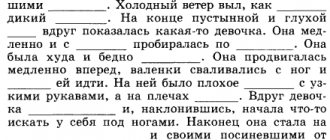Vocabulary games for students and adults
A good level of language proficiency is assumed. The purpose of these tasks is to liberate students and make maximum use of their vocabulary.
"Banana Game"
Such activities are good memory training and learning new words. At the beginning, students read or listen to texts with new words, and at the end of the lesson, a memorization test is carried out. Students are divided into pairs. One of them has a list of fresh vocabulary, the second has a closed textbook. The first one reads the sentence, inserting “banana” instead of the new word, and the second one must guess what the word is based on its meaning.
For example, the City
.
A sentence might sound like this: Beside that, visiting museums and art galleries, exhibitions and theaters, simple “banana” or traveling can be very useful for every boy or girl, if they want to broaden their outlook, to study some subjects profoundly
.
Correct answer: sightseeing
.
"Running Dictation"
A dynamic game for reviewing vocabulary, developing memory and spelling. The class is divided into 2 teams. The text is hung on the board. The “runner” from each team must remember part of the text and “bring” it to a pre-selected “secretary”. Important: you cannot shout or speak the text while walking! The teacher claps his hands and the runner takes over. The first team to write down all the text wins.
"Memory Game"
This game is aimed at practicing the learned vocabulary and practicing phonetics. The teacher prepares sheets of paper with fixed expressions on some topic in advance and cuts them into genders. For example, on the topic “time” run out of time - 2 cards are made from this expression, which will later be laid out in two columns. Other expressions are cut in a similar way.
Students take turns coming up and opening one card from the first column and saying what the continuation should be. Next he opens another card, but from the second column. If you guess correctly, he takes two; if not, he returns both cards back. The team that collects the largest number of stable expressions the fastest wins.
The next block of classes is more entertaining in nature. They are designed to overcome the language barrier and relieve psychological stress among students.
"The crocodile game"
A classic game of crocodile for company. Only participants describe the hidden word exclusively in English. 2 participants are selected by drawing lots. The first one thinks of a word, phrase or stable expression, and the second one shows it without uttering a sound. The rest of the participants guess. The first guesser goes to the center and replaces the showing player, who in turn tells him a new word.
"Cards"
Absolutely any tasks using cards, but in English. They can be selected on a specific topic or be purely entertaining. You can also use online cards.
PS Adult students can use all these games not only in training classes with teachers, but also independently, at home, with friends and in interest groups.
Games for any age and skill level
Each task in this block can be adapted by the teacher to suit different levels of language proficiency, with the exception of the level of preschoolers who cannot write.
"Crossword"
This game is designed for students who are proficient in writing. Its goal is to expand vocabulary and develop competent writing. The tasks can be prepared by the teacher in advance or the task for the students will be a crossword puzzle on a specific topic.
"Fill in the Missing Letters"
This task is often used as an exercise to practice competent writing. The teacher writes words on the board, deliberately omitting letters from them. The words must sound similar, for example, ball
and
doll
,
mystery
and
misery
,
be
and
bee
,
air
and
ear
, and by spelling, for example,
coarse
and
course
,
complement
and
compliment
,
creak
and
creek
.
"Explain the word"
The first participant draws out a card with a picture (or, for example, takes an object out of a bag), but does not show it. Its task is to describe who or what is depicted on the card. Other participants must guess what it is. For example: It's a food. Sweet and cold. Children like to eat it in summer. Made of milk." Whoever guesses goes to describe the next card.
"Rhythme"
The tasks are not only entertaining, but also educational. The teacher calls the word, the students choose a rhyme. It is important to name the rhyme quickly, without thinking. You need to play in a circle, all students participate. The one who named the wrong rhyme or non-existent word is eliminated. For example: slight – right
,
go – slow
,
look – book
, etc.
Complication: you can answer with a rhyme only if the word matches the topic. You can also complicate the task by adding a creative task, namely, from the given words, come up with a poem on a topic, etc. It all depends on the teacher’s training and the level of language proficiency of the students.
"Crossing the river"
This active game will appeal to both adults and children. It is aimed at repeating vocabulary on the topic and practicing the correct pronunciation of words.
Participants are divided into 2 teams. Each team is given the same number of cards. Participants take turns opening cards, naming the item in English or reading its name, and then giving a translation. If the player pronounces and translates correctly, he throws the card on the floor and takes a step forward, stepping onto the so-called “island”. The team that gets to the “shore” first wins.
Catalog of tasks, exercises and speech material based on lexical topics for children with disabilities
Catalog of tasks, exercises and speech material based on lexical topics for children with disabilities
Fadyushina Yu.V.
teacher - defectologist
Yekaterinburg city
MBDOU - kindergarten
combined type No. 203
Currently, the preschool education system faces special challenges. This is caused by the radical transformations taking place in Russia in recent years.
The modern system of preschool education is developing as open, variable, focused on providing quality educational services to families with preschool-age children, including those with developmental problems.
Law of the Russian Federation of July 10, 1992 N 3266-1 (as amended on November 12, 2012) “On Education” in Article 18: for the education of preschool children, the protection and strengthening of their physical and mental health, the development of individual abilities and the necessary correction of developmental disorders of these children, a network of preschool educational institutions operates to help the family.
The Federal Law “On Education in the Russian Federation” N 273-FZ dated December 29, 2012, as amended in 2015-2016, states that preschool education is aimed at creating a general culture, developing physical, intellectual, moral, aesthetic and personal qualities, creating prerequisites educational activities, maintaining and strengthening the health of preschool children.
Preschool education programs are aimed at the diversified development of children, taking into account their age and individual characteristics, including achieving a level of development necessary and sufficient for their successful mastery of educational programs of primary general education, based on an individual approach to preschool children and types specific to these children activities.
Thus, it is important to reveal the abilities and maximize the capabilities of each child, motivate children to further study at school, and prepare students for society.
In accordance with the Convention on the Rights of the Child (1989) and the World Declaration on the Survival, Protection and Development of Children (1993), every child must be guaranteed the right to development, upbringing and education, taking into account his individual capabilities. The provisions reflected in these documents apply to all children, including children with disabilities. They provide legal protection of childhood, support for the family as the child’s natural environment of life, health care, ensuring the upbringing, development and education of children, and support for those who most need it.
Today, significant changes are taking place in the theory and practice of education in the Russian Federation - a change in the content of education, focused on the individualization of children’s education in accordance with their individual needs and capabilities.
In the Federal State Educational Standard for Preschool Education, among the principles of preschool education, the individualization of preschool education is highlighted, which should be understood as the construction of the educational process based on the individual characteristics of each child. One of the objectives of the standard is aimed at creating favorable conditions for the development of children in accordance with their age and individual characteristics and inclinations, developing the abilities and creative potential of each child as a subject of relationships with himself, other children, adults and the world.
This provision acquires particular relevance in relation to the process of education of children with disabilities. The problem of creating inclusive education is caused by the trend of increasing the number of children with disabilities. According to the Research Institute of Childhood of the Russian Federation, there is an annual increase in the size of this category of the child population. In order to ensure their optimal social protection in society, the state has defined a whole range of additional rights and guarantees.
Children with disabilities have ambiguous structural characteristics; a larger percentage of them are children with mental retardation.
Mental retardation (MDD) is a violation of the normal pace of mental development, when certain mental functions (memory, attention, thinking, emotional-volitional sphere) lag behind in their development from accepted psychological norms for a given age.
Children with mental retardation experience limited mental and cognitive capabilities that do not allow the child to successfully cope with the tasks and demands that society places on him. Due to a poorly developed voluntary sphere (the ability to concentrate, switch attention, perseverance, the ability to retain knowledge, work according to a model), the child gets tired and exhausted very quickly. Which leads to a decrease in learning skills.
The delay in the rate of development is reversible. Therefore, timely organization of corrective intervention is the main factor determining successful social adaptation and rehabilitation of a problem child. Corrective pedagogical influence is aimed at overcoming and preventing developmental disorders, as well as at developing a certain range of knowledge and skills necessary for successfully preparing children for school.
Among the most characteristic features of children with mental retardation is a specific manifestation of a speech anomaly, in which the formation of the main components of the speech system is disrupted or lags behind the norm: vocabulary, grammar, phonetics. In this case, deviations in the semantic and pronunciation aspects of speech are typical. Speech impairment in preschoolers can vary from a complete lack of common speech to the presence of extensive speech with pronounced manifestations of lexical-grammatical and phonetic-phonemic underdevelopment.
The speech of children with mental retardation differs significantly from the norm, which has a serious impact on the child’s overall development, does not allow him to fully communicate and play with peers, makes it difficult to understand the world around him, and aggravates the child’s emotional and mental state.
A preschool educational institution is the first and most responsible link in the general system of public education. Mastery of the native language is one of the most important acquisitions of a child in preschool childhood. It is preschool childhood that is especially sensitive to speech acquisition. Therefore, the process of speech development is considered in modern preschool education as the general basis for raising and educating children.
K.D. Ushinsky said that the native word is the basis of all mental development and the treasury of all knowledge. Timely and correct acquisition of speech by a child is the most important condition for full mental development and one of the directions in the pedagogical work of a preschool institution. Without well-developed speech, there is no real communication, no true success in learning.
The development of speech is closely related to the intellectual and cognitive development of the child, since speech and thinking have one physiological source - the human brain. If cognitive (mental) processes - perception, memory, attention, thinking - develop normally, then the child’s speech is richer, more expressive, detailed, and perfect. That is why the cognitive processes listed above are called the psychological basis of speech, the level of development of which directly affects the child’s speech. Developed perception and the presence of cognitive interests are a serious basis for replenishing the vocabulary and improving the grammatical structure of speech. The development of mental operations (analysis, synthesis, comparison, generalization, classification, etc.) is directly related to the formation of explanatory speech. Cognitive needs (the desire to receive information and share it) stimulate the development of coherent forms of speech - dialogue and monologue. It is especially necessary to note the importance of developed coherent speech, since it is in it that the child’s achievements are concentrated not only in speech development, but also in personal development.
That is why serious work on speech development is provided for children with mental retardation, which is carried out in a system that covers all its aspects (vocabulary, grammatical structure, sound culture of speech, coherent speech). As part of the program, speech tasks are solved in the process of integration with other types of children's activities. This allows not only to redistribute the academic load, but also to organize the normal functioning of speech in children’s lives.
Thus, speech defects in children with mental retardation manifest themselves against the background of insufficient development of cognitive activity and are caused by the peculiarities of their psychophysical development.
Therefore, it is necessary to identify children with mental retardation as early as possible and provide corrective assistance in kindergarten and family settings.
For the speech and cognitive development of children with mental retardation, I systematized speech material and
created a catalog of tasks and exercises based on lexical topics, which:
- promotes the development of all components of speech in preschool children with mental retardation (expansion and activation of vocabulary, formation and development of grammatical speech, development of coherent speech);
- helps enrich lessons with children with material on the development of cognitive processes such as: perception (auditory and visual), attention (concentration, distribution and switching), memory (operational speech and figurative), thinking (operations of analysis, synthesis, comparison, generalization, classification) ;
- helps organize activities in a playful way, since the game maximizes the potential of children;
- The use of material on the topic at all scheduled moments helps;
- ensures the interaction of preschool teachers in a uniform approach to speech work with preschoolers to consolidate correct speech skills, expand, clarify and activate vocabulary;
- helps to easily select material for recommendations to parents on working with children at home.
To ensure an integrated approach, it is necessary that several problems be solved in one lesson. At the same time, knowing the problems of a particular child, you can select appropriate exercises, focusing on the target orientation of the tasks.
- Expansion and activation of the dictionary:
- Continue the sentence.
- What's extra?
- Say the opposite.
- Choose a sign/action.
- Choose a general word.
- When do they say that?
- What's wrong?
- Finish the sentence.
- Fill in the missing word in the sentence.
- Guess the riddles.
- Find out by sign/* action.
- Name the parts of the whole.
- How can you complete the sentences?
- Remember the words.
- Remember the chain of words.
- Remember a few words
- Formation and development of the grammatical structure of speech:
- Which word doesn't fit?
- Put together a proposal.
- Continue the sentence.
- Finish the sentence.
- Fill in the missing word in the sentence.
- Use the word or phrase in the correct form.
- Count to five.
- Call me kindly.
- Change according to the example.
- Correct the error.
- Choose a sign/action.
- Development of coherent speech:
- When do they say that?
- Explain a word.
- Text for retelling.
- Proverbs and sayings
- Poetry
- Counting books.
- What's wrong?
- What are the same and how are they different from each other?
- Tricky questions.
- Finish the sentence.
- Continue the sentence.
- Fill in the missing word in the sentence.
- Development of perception:
- Which word is different from the others?
- Which word is the shortest/longest?
- Give me a word
- Development of hand-eye coordination:
- Finger gymnastics
- Dynamic pauses
- Development of thinking:
- Guess the riddles.
- Choose a pair word.
- What are the same and how are they different from each other?
- When do they say that?
- What's wrong?
- What's extra?
- Say the opposite.
- Choose a sign/action.
- Finish the sentence.
- Fill in the missing word in the sentence.
- How can you complete the sentences?
- Tricky questions.
- Smart puzzles.
- Remember the words.
- Remember the chain of words.
- Development of attention:
- Tricky questions.
- Smart puzzles.
- Remember the words.
- Remember the chain of words.
- Remember a few words.
- Which word is different from the others?
- Guess the riddles
- What are the same and how are they different from each other?
- Memory development:
- Remember the words.
- Remember the chain of words.
- Remember a few words.
- Laying out sticks from memory
- Tongue Twisters
- Counting books
- Poetry
A summary of the tasks shows what you need to pay attention to when performing the exercises:
- Insert the missing word into the sentence: selecting a word on a lexical topic and agreeing it with all members of the sentence.
- Finish the sentence: selecting a word on a lexical topic in the context of a sentence.
- Remember pairs of words: combining words into pairs on different logical grounds.
- Remember the words: work with the use of categories when recalling a presented series of words.
- Remember the chain of words: working with material where the plot connection and sequence between words are pre-established.
- Change according to the model: using singular and plural nouns, possessive and qualitative adjectives, changing verbs in gender, number, person, tense, changing adjectives in gender, number.
- Correct the error: finding an error in agreeing the parts of speech in a sentence.
- How can you complete the sentences? (selection of a logical ending to the sentence).
- Which word doesn't fit? (work using cognate words).
- Which word is different from the others? (comparing words by sound).
- Which word is the shortest and longest? (comparison of the syllabic structure of words).
- When do they say that? (interpretation of proverbs and sayings).
- Call it affectionately: the formation is derogatory - the affectionate form of nouns.
- Name the parts of the whole: choosing words to name the parts of the whole.
- Guess the riddles: guessing based on essential features described in poetic form.
- Match the word: use simple verbal analogies;
- Choose a sign/action: selection of adjectives and verbs for nouns.
- Prompt a word: adding a word that matches the sound and meaning in a rhyming couplet.
- Continue the sentence: selection of homogeneous members of the sentence;
- Say the opposite: selection of antonyms.
- Putting together a sentence: Agreeing parts of speech and arranging words in a sentence.
- Count to five: agreement between numerals and nouns.
- Find out by sign/action: identifying an object or phenomenon by its essential features.
- Smart puzzles: logical tasks for discrimination, comparison, denial, combination.
- Use the word/phrase in the correct form: declension of the word or phrase.
- Tricky questions: formulating a detailed and reasoned answer.
- What's extra? (classification according to specified characteristics).
- What's wrong? (finding semantic errors in sentences).
- What are the same and how are they different from each other? (finding and explaining the similarities and differences of objects and phenomena based on ideas).
Bibliography:
- 33 lexical topics. Finger games, exercises for coordinating words with movement, riddles for children. (6-7 years) / Author – compiler A.V. Nikitina. – St. Petersburg. KARO, 2009.
4th ed. - M: Iris - press, 2007.
- Ageeva I.D. 500 verses for charging reeds. – M.: Sphere shopping center, 2010
- Agranovich Z.E. A collection of homework to help speech therapists and parents to overcome lexical and grammatical underdevelopment of speech in preschoolers with OPD. – SPb.: “CHILDHOOD – PRESS”, 2010.
- Agranovich Z.E. A collection of homework to help speech therapists and parents overcome the phonemic aspect of speech in older preschoolers. – SPb.: “CHILDHOOD – PRESS”, 2006.
- Alexandrova T.V. Living sounds, or Phonetics for preschoolers: Educational and methodological manual for speech therapists and educators. - St. Petersburg: Detstvo-press, 2005.
- Alyabyeva E.A. games for children 5-8 years old: Development of logical thinking and speech. – M.: TC Sfera, 2010.
- Arefieva L.N. Lexical topics on the development of speech of children 4-8 years old: Methodological manual. - M.: TC Sfera, 2008. - 128 pp. - (Series “Speech therapist in preschool educational institutions.”)
- Arushanova A.G. Speech and verbal communication of children. – M.: Mozaika-Sintez, 2005. – 296 p.
- Baykova S.V. Development of vocabulary and grammatical structure in preschoolers: Card file of knowledge with complication. - St. Petersburg: KARO, 2005.
- Belousova L. B. Amazing stories. Notes of classes on speech development using TRIZ elements for children of senior preschool age / Edited by B. B. Finkelyntein. - St. Petersburg: “CHILDHOOD-PRESS”, 2003
- Belousova L.E. Learn to retell? It's simple! – St. Petersburg: Litera Publishing House, 2009.
- Boryakova N.Yu. Psychological characteristics of preschool children with mental retardation // Education. and training children with disorders in development. – 2004. – No. 1. – p. 10
- Bykova I.A. Teaching children to read and write in a playful way: Methodological manual. – SPb.: “CHILDHOOD - PRESS”, 2006.
- Galanov A.S. Counting books. Games – tasks for activities with children. – M.: School Press, 2004.
- Goncharova V.A. Features of the vocabulary of preschool children with speech pathology and mental retardation // Speech therapist in kindergarten. – 2008. – No. 1(26). - With. 9
- Grigorovich L.A. Ermolenko O.S. and others. 150 tests, games, exercises to prepare children for school.
- Grizik T.I. Speech development of 6-7 year old children: a methodological manual for preschool teachers. education Institutions. – M.: Education, 2007. – 224 p.
- Elkina N.V. Formation of coherent speech in preschool children: a textbook. Yaroslavl: YAGPU Publishing House, 2004. – 76 p.
- Game activities in speech development classes. Junior group. / Auto-stat. O.I. Bochkareva. – Volgograd: ITD “Corypheus”, 2008.
- Game activities in speech development classes. Preparatory group. / Author – comp. O.I. Bochkareva. – Volgograd: ITD “Corypheus”, 2008.
- Kondratyeva S.Yu., Agaputova O.E. Correctional and play activities in working with preschoolers with mental retardation. – SPb.: CHILDHOOD – PRESS, 2008.
- Kondratyeva S.Yu., Agaputova O.E. Corrective play activities in working with preschoolers with mental retardation. – St. Petersburg: Detstvo-Press, 2008. – 176 p.
- Konovalenko V.V., Konovalenko S.V. Development of coherent speech. Frontal speech therapy classes on the lexical-semantic topic “Spring” in a preparatory school group for children with ODD. Toolkit. – M.: Publishing House GNOM and D, 2006.
- Konovalenko V.V., Konovalenko S.V. Formation of coherent speech and development of logical thinking in children of senior preschool age with ODD. Some approaches and techniques. – M.: Gnom i D, 2003. – 48 p.
- Notes of integrated classes in the preparatory group of kindergarten. Cognitive development. Speech development. Literacy training: A practical guide for preschool teachers / Author. – comp. Adzhi A.V. – Voronezh: TC “Teacher”, 2006.
- Kostenkova Yu.A., Trigger R.D., Shevchenko S.G. Children with mental retardation: features of speech, writing, reading. – M.: School Press, 2004. – 64 p.
- Krupenchuk O.I. Graphic dictations for girls 6-7 years old. - St. Petersburg: Litera Publishing House, 2009
- Krupenchuk O.I. Graphic dictations for boys 6-7 years old. - St. Petersburg: Litera Publishing House, 2009
- Krupenchuk O.I. Games with sounds and letters for preschoolers 5-7 years old. – St. Petersburg. "Litera"
- Krupenchuk O.I. Teach me to speak correctly! – St. Petersburg: Litera Publishing House, 2005.
- Kuznetsova E.V. Speech therapy rhythms in games and exercises for children with severe speech disorders. Methodology of correctional and educational work with children 3-4 years old; lesson notes, games and exercises. – M.: Publishing house GNOM and D, 2002.
- Kuritsyna E.M., Taraeva L.A. Big book of classes on speech development - M.: ROSMEN, 2010.
- Kutsakova L.V., Gubareva Yu.N. 1000 games and puzzles for preschoolers. M.: Astrel Publishing House LLC, AST Publishing House LLC, 2000.
- Lalaeva R.I., Serebryakova N.V. Correction of general speech underdevelopment in preschool children (formation of vocabulary and grammatical structure). – St. Petersburg: Soyuz, 1999. – 160 p.
- Lalaeva R.I., Serebryakova N.V. Formation of vocabulary and grammatical structure in preschool children with general speech underdevelopment. – St. Petersburg: Publishing house “SOYUZ”, 2001.
- Lalaeva R.I., Serebryakova N.V. Formation of correct conversational speech in preschoolers. – SPb.: SOYUZ, 2004. – 224 p.
- Lalaeva R.I., Serebryakova N.V., Zorina S.V. Speech disorders and their correction in children with mental retardation. – M.: Vlados, 2004. – 303 p.
- Lopatina L.V., Ivanova O.V. Speech therapy work on the development of oral speech perception by preschoolers with mental retardation: A textbook. – St. Petersburg: KARO, 2007.
- Lukina N.A., Nikkinen I.I. Teach me to hear (Development of auditory perception, attention and memory). – St. Petersburg: “Parity”, 2003
- Mironova N.M. We develop phonemic awareness in children of the preparatory logo group. Album of exercises for preschoolers with speech disorders / N.M. Mironova, - M,: Publishing house GNOM and D, 2008.
- Morozova I.A. Classes on speech development in a special kindergarten. In 3 issues. Vol. 1: First year of study: a manual for speech therapist, teacher - defectologist, educator - M.: Humanitarian. Ed. VLADOS center, 2006.
- Morozova I.A. Classes on speech development in a special kindergarten. – M.: Vlados, 2006. – 246 p.
- Speech disorders and their correction in children with mental retardation: a textbook for higher education students. educational institutions / R.I. Lalaeva., N.V. Serebryakova, S.V. Zorina. – M.: Humanitarian. Ed. VLADOS Center, 2004.
- Nishcheva N.V. Multi-colored fairy tales: A series of classes on speech development, the formation of color perception and color discrimination in preschool children. - SPb., “CHILDHOOD-PRESS”, 1999.
- Nishcheva N.V. A program of correctional and developmental work in the speech therapy group of a kindergarten for children with general speech underdevelopment (from 4 to 7 years old). – SPb.: CHILDHOOD – PRESS, 2007.
- Novikova V.P. Mathematics in kindergarten. Preparatory group. – M.: Mosaic – Synthesis, 2006.
- Novikovskaya O.A. Poems for speech development. 4-7 years old. - M.: Astrel; St. Petersburg: Astrel, 2009
- Novotortseva N.V. Speech development 2. A popular guide for parents and teachers. – Yaroslavl: Development Academy LLC, 1997.
- Novotortseva N.V. Speech development 2. A popular guide for parents and teachers. – Yaroslavl: Development Academy LLC, 1997.
- Novotortseva N.V. Speech development. Didactic material on speech development in preschoolers and primary schoolchildren. – Yaroslavl: Development Academy LLC, 1996..
- Novotortseva N.V. Learning to write. Teaching literacy in kindergarten. A popular guide for parents and teachers. – Yaroslavl: Development Academy LLC, 1998.
- Novotortseva N.V. Children's speech development. – Yaroslavl: Gringo LLP, 1995. – 240 p.
- Enrichment and activation of vocabulary. Preparatory group. / Author – comp. O.I. Bochkareva. – Volgograd: ITD “Corypheus”, 2009.
- Petrova T.I., Petrova E.S. Games and activities for the development of speech in preschoolers. Book 2. Senior group. – M.: School Press, 2006.
- Proverbs, sayings and popular expressions: Schoolchild's dictionary / Comp. ON THE. Rodnaya - St. Petersburg: Litera Publishing House, 2003.
- Development of speech and creativity in preschool children: Games, exercises, lesson notes / Ed. O.S. Ushakova. – M.: TC Sfera, 2007.
- Speech development: notes from classes with children of senior preschool age. / Author – comp. L.E. Kylasova. – Volgograd: Teacher, 2007.
- Development of coherent speech. Middle group. / Author – comp. T.V. Ivanova. - Volgograd: ITD “Corypheus”, 2009.
- Selikhova L.G. Familiarization with nature and speech development. Integrated classes. For classes with children of senior preschool age (5 - 7 years old). – M.: Mosaic – Synthesis, 2008.
- Sidorova U. M. Formation of speech and cognitive activity in children with special needs: Exercises, logical tasks, didactic games, games - activities. – M.: TC Sfera, 2005.
- Sidorova U.M. Speech development tasks for children in the middle group of preschool educational institutions. – M.: TC Sfera, 2008.
- Slepovich E.S. Features of active speech of preschool children lagging behind in development. M., 1978.
- Slepovich E.S. Speech formation in preschool children with mental retardation. – Minsk, 1983.
- Teremkova N.E. Speech therapy homework for children 5-7 years old with ODD (albums 1-3). – M.: Gnom i D, 2005. – 48 p.
- Tikhomirova L.F. Logic for preschoolers. Exercises for every day. A popular manual for parents and teachers - Yaroslavl: Development Academy: Academy, K: Academy Holding, 2000.
- Tkachenko T.A. If the child speaks poorly. – St. Petersburg: Childhood – press, 1999.
- Tkachenko T.A. Speech therapy notebook. Formation of lexical and grammatical concepts. SPb.: “CHILDHOOD - PRESS”, 1999.
- Manager L.V. Preparing for school in kindergarten. Counting, reading, speaking, thinking. For children 5-6 years old. – Yaroslavl: Academy of Development, 2007.
- Elimination of general speech underdevelopment in preschool children: practical work. Manual / Filicheva T.B., G.V. Chirkina. –
- Falkovich T.A., Barylkina L.P. Speech development, preparation for mastering writing: Lesson for preschoolers in additional education institutions. – M.: VAKO, 2005.
- Filicheva T.B., Tumanova T.V. Children with general speech underdevelopment. Education and training. Educational and methodological manual. M.: Publishing House GNOM and D, 2000.
Photos from a personal archive have not previously been exhibited on the Internet.







